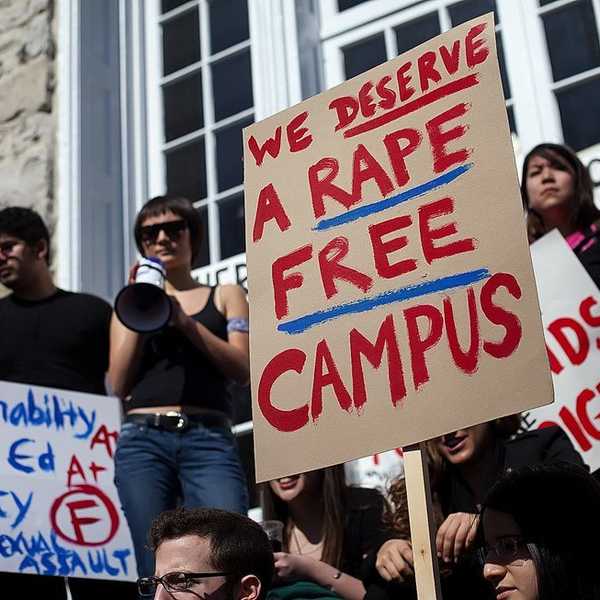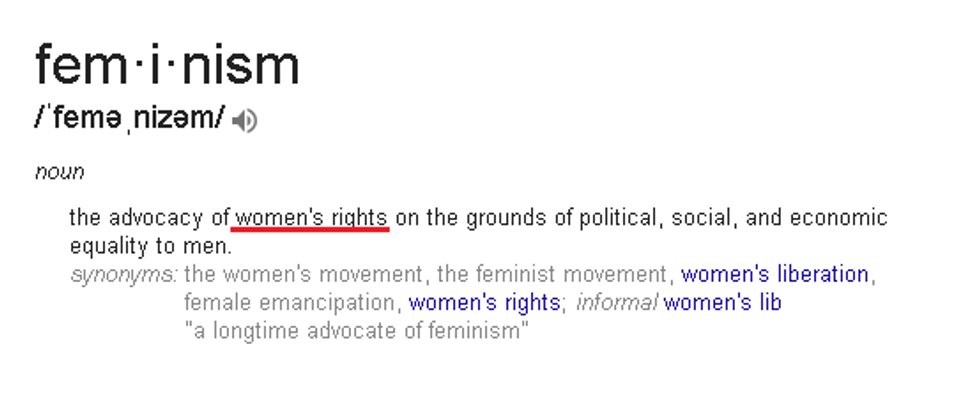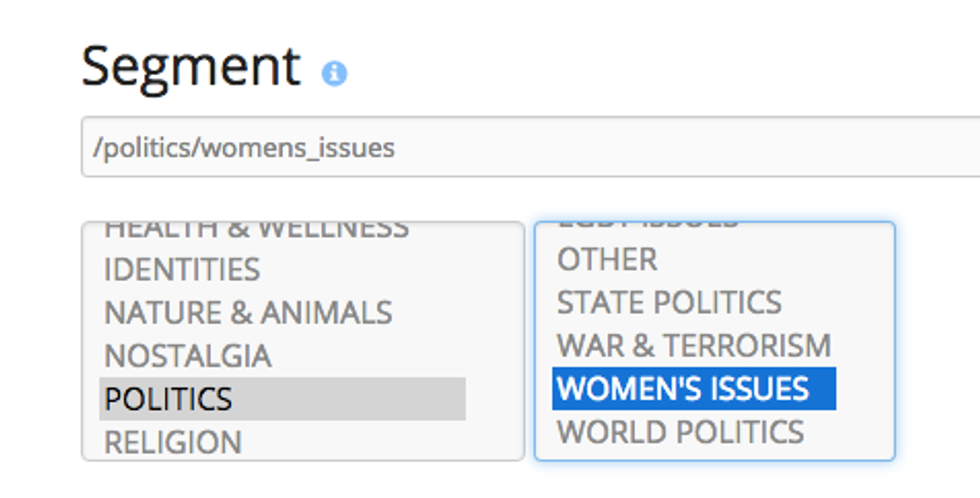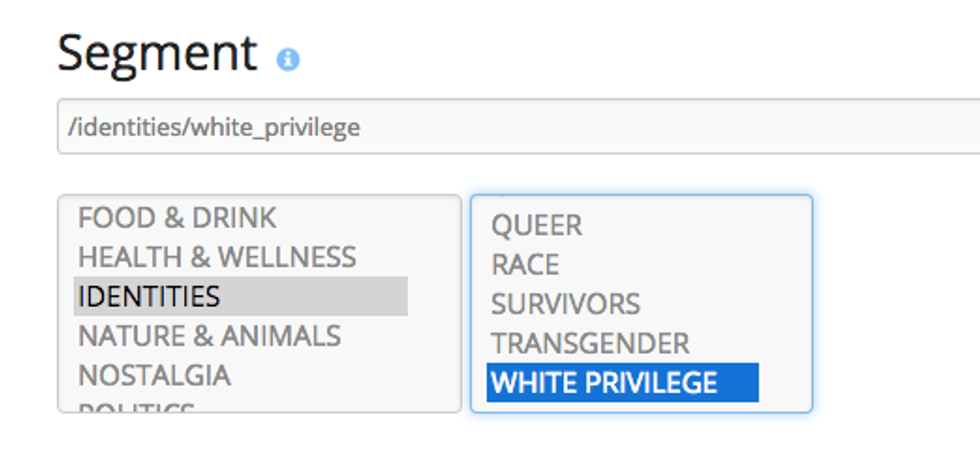I never had much exposure to feminism until I went to college. This will be an experience for all college-goers. You will encounter aspects about feminism in the curriculum - it will happen, mark my words. This ideology didn't die once women won the right to vote in 1920; it has since been overtaken by PC police, and self-proclaimed, "social justice warriors," (SJWs) and, "progressives," and has flooded academia.
Gender Studies 101
I'd like to talk about my own personal experience with feminism and why I don't buy the whole, "It's standing for equal rights and if you're not a feminist you're sexist," shame tactic its ideologues imbue. When I enrolled my first year at Chatham, I was to take a hybrid course between a writing class and a gender studies class. Despite having already earned the English credits at a community college my senior year of high school, the administration at Chatham University made me take their First-Year Writing Seminar anyway, solely because of the gender studies aspect. The class should be renamed to Gender Studies 101, since we did very little writing and mostly discussed identity politics and how my whiteness and my maleness made me more privileged than the other students, and that I should apologies for it, every time I speak. But it's my fault for choosing to go to a previously all female, Ivy League school in the most progressive county in Pennsylvania.
I can recall in my sociology class listing groups of people and categorizing them according to their specific privileges. These categories were, "male, white, able-bodied, and wealthy." Under the, "male," category, one of the privileges listed was, "safety." We like to push the narrative that women are poor helpless victims, but the fact is, men are more likely to be victims of violent crime. Why then was safety listed as a male privilege? It would seem that violence men face is not as important to warrent the attention of feminists.
Semantics
Many college students I get into arguments with insist that feminism is simply the belief in gender equality. This is only half true. The very word has a clear focus on women’s equality and women’s rights to that of men. Look up any dictionary definition, and you will see that feminism has little to no focus on men’s issues:
The Pillars of Feminism: Patriarchy and Privilege
Many feminist advocates, and even non-feminsts, will argue that women’s issues are more important than men’s issues. After all, it is a central pillar of feminism to believe that men are on top hogging the wealth and power while women are at the bottom of the corporate ladder being short-changed and denied equal rights. This narrative, while essential to the feminist creed, is false. Men absolutely face problems in society that are just as severe, if not even more urgent, than the plights of women. Feminists will turn a blind eye to the trials of men. For example, men are raped more than women, when you account for prison statistics. A feminist’s response to this argument is that prisoners don’t count - they’re separated from society. For a woman, prison may seem like a distant and unlikely scenario, but men are more likely to be convicted for committing the same crime, and are proven to be given longer sentences and harsher punishments, according to a Harvard study by Sonja Starr. So yes, for the privileged female, prison rape is not a looming threat. But the overwhelming majority of our prisoners are nonviolent, male offenders. The gender gap in prison sentences is significantly larger than the race gap, yet feminists, who champion themselves on advocating equality, put far more emphasis on race and ignore gender.
Ignoring Male Suicide
And what about the suicide gap? Men commit suicide at a notably higher rate than women. Why don’t the feminists talk about that gender gap? Because the feminist narrative is only concerned with the plights of women and other "oppressed minorities," and will go so far as to fabricate statistics in order to gain support.
Fabricated Figures
We’ve often heard that one in four or one in five, or one in three college women will be sexually assaulted or raped. This statistic is unreliable. The body of statistics out there indicate that it could range from one in four to one in 53, according to the Bureau of Justice Statistics. The reason why the one in four figure is trumpeted on campuses and in the media is because it’s more likely to gain attention and funding. How else would all these single women with gender studies degrees be able to make a living?
The Wage Gap Myth
This is a common one. So much so that average non-feminist, non-academic people believe it. Feminists argue that women make 77 cents to every man’s dollar. But this is a colloquialism. The figures show us that the average woman’s income and the average income of men differ by about 33%. But if you look at the highest paying jobs, men are the ones who dominate. Doctors, lawyers, businessmen, politicians, investors, inventors, chemical engineers, electricians, computer programmers, etc. Now look at a list of the jobs dominated by women: elementary school teacher, psychologists, nursing. Is it any wonder that men on average make more money than women? Men are more likely and more willing to negotiate pay. Men tend to work longer hours. This is why men make more money than women, and this is where the wage gap comes from. If a woman feels she’s being discriminated against because of her sex, she can file a lawsuit, because it’s illegal. Why would the patriarchy give women such a right?
The, "Historically Oppressed," Myth
Another feminist myth that has worked its way into mainstream thought is that women, historically, have been oppressed in the west. While it’s true that the United States used to be patriarchal in that only men could run for office and only taxpaying men voted, women were not oppressed. To say that they were is a disgrace to women in eastern, theocratic countries who are facing genuine oppression. Yes, gender roles were strictly enforced, but it had to be that way. Women were the only sex that could feed babies, and thus men had to go out and work and provide financially while women stayed home. This is how it had to be, and it was just as hard on men if not harder. Men were also restricted to their own gender role, which many feminists, (but not all), fail to admit. Men were providers and protectors, which meant that men had to be willing to risk their lives in order to protect women and children. It’s why women and children were given priority in a disaster situation like the Titanic. And while women didn’t have the right to vote, that was discrimination, not oppression. Women couldn’t vote because they didn’t pay taxes, because they didn’t have jobs because they weren’t educated because they were home with their children. If they didn’t have children, we wouldn’t be here.
Some women were educated and did have jobs, so we know that it was in fact possible. In my philosophy class, we were told that ancient Greece was patriarchal because there were very few female philosophers compared to male. But the Greek goddess of wisdom is Athena. Let me reiterate: a female was the embodiment of wisdom. Why would the Greeks do this if they were truly believed in male-supremacy? There is a comprehensive list of female philosophers that can be found on the internet. In addition, there were Greek empresses as well, aka, women who ruled the entire empire. To say women faced systems of oppression that favored men means that these women overcame these systems yet failed to end them.
Most traditional gender roles go back to anatomical, biological and hormonal differences between men and women. Only women can breastfeed, give birth, etc., so thus they were nurturers. Men are bigger, stronger, and produce more testosterone, which makes them risk-takers. This no doubt leads to more men being leaders, aggressors, conquerers, fighters, etc. Again, most if not all traditional gender roles can be traced back to biological differences. And BOTH sexes were confined to gender roles, not just women. So why the emphasis on female gender roles? Well, society naturally favors women, thus a movement for equality has a pro-women bias.
Back to Semantics
I might as well talk about the negative effects of using the term, "feminism," and associating it with equality. When people hear the word, "feminism," they think of two things: women and equality. This paints women in a positive light, as if women are the sole patrons of equality. They describe an oppressive society as patriarchal. When people hear patriarchy, they correctly think of men, and oppression. By using the language that they do, feminists paint women to be saintlike advocates of justice and goodness, while men are made out to be oppressive aggressors. This is just perpetuating stereotypes about certain groups of people, the very thing feminists claim to oppose.
In Odyssey
This pro-woman, pro-feminist bias is everywhere. To give an example, look no further than Odyssey. When categorizing an article, in the segment, "Politics," there is a subsegment, "Women's Issues," but no such category exists for men:
Likewise, under the segment, "Identities," there is a comprehensive list, including gay, lesbian, LGBT, Transgender and Queer. If I'm not mistaken, those could all be under the same category: LGBTQ+. Five subsegments are devoted to the LGBT+ community, yet there's only three racial categories: African-American, Asian-American, and White Privilege:
It's interesting that instead of including European-American, the administration at Odyssey blatantly lists, "White Privilege." I did not know, "white privilege," was an identity. What's also interesting is the statistics show that Asian-Americans are the wealthiest demographic in the country. Asian people are not only wealthier, but they're better educated, and no one views Asian people as threatening. Everything that can be said about white privilege is even more true for Asian people in America, yet the folks at Odyssey, and feminists everywhere, point their fingers exclusively at white people. Asian people are just another marginalized minority group in the eyes of the progressive, social-justice feminist. I would go so far as to call this blatant accusatory attitude toward white people racist, but according to SJWs, "reverse racism," doesn't exist. Evidently you cannot be racist to white people. Now marginalized groups have the privilege of being able to call out racism when it applies to them, but white people cannot, because SJWs say so. In response, I say that people should check their facts, not their privilege. Reverse racism isn't a thing: it should still just be called racism.
I don't want to point my finger at Odyssey. For the most part it is an accepting community; they allow me to publish my material, after all, even if they don't agree with it. All I can do is urge the Odyssey administration to remove the, "white privilege," subsegment and add a category for men's issues.
Conclusion
It is for these reasons I reject the feminist label and most of its central ideas. Feminism is like a box with pretty wrapping paper on it. The wrapping paper is the guise of, “equality between the sexes,” but when you remove it, there’s nothing inside. It’s just an ugly, empty box. The empress has no clothes.
























